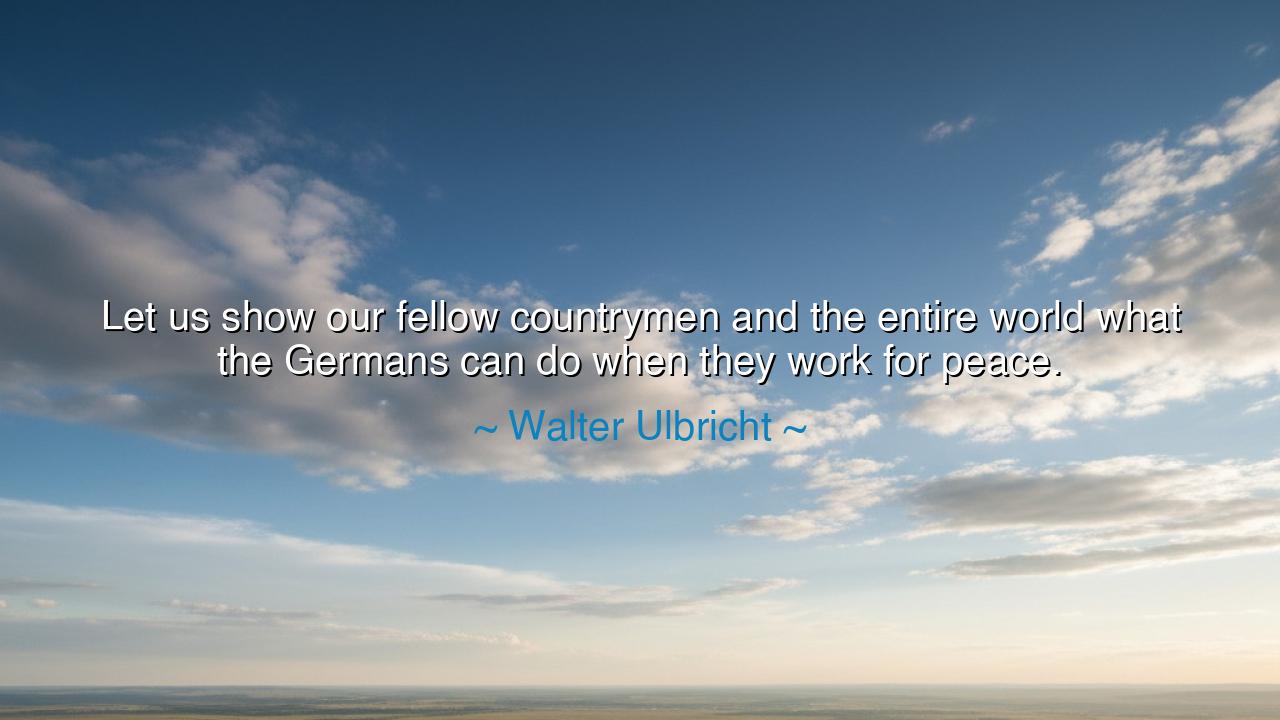
Let us show our fellow countrymen and the entire world what the
Let us show our fellow countrymen and the entire world what the Germans can do when they work for peace.






Hear the words of Walter Ulbricht, spoken in the aftermath of fire and ruin, when nations still trembled from the echo of war: “Let us show our fellow countrymen and the entire world what the Germans can do when they work for peace.” In this utterance lies the cry of a people scarred by the devastation they had unleashed, a call not for conquest, but for redemption. It was a moment when the burden of history weighed heavily upon a nation, and the path forward was not written in swords, but in the labor of rebuilding, in the pursuit of reconciliation, and in the hope of proving to the world that even those who had once wrought destruction could learn the ways of peace.
The meaning of this quote is powerful. Ulbricht, leader of East Germany in the years after the Second World War, understood that his people were seen with suspicion, even hostility, by much of the globe. The legacy of Hitler’s regime had cast a long shadow, and the name of the German nation was tied to blood and devastation. To speak of showing the world “what the Germans can do” was not a boast of might, but a plea for transformation: that strength, ingenuity, and discipline might be turned away from war and redirected toward building, healing, and reconciling. To work for peace was to redeem the name of a nation.
The origin of this declaration lies in Ulbricht’s role as a political architect of East Germany after 1945. While he was a loyal servant of Soviet ideology, his words reflect a broader truth that transcends politics: that after destruction, a people must choose either to wallow in defeat or to rise with dignity. Ulbricht chose to call upon his fellow countrymen to rise—not with arms, but with the tools of labor, industry, and cooperative effort. In a time when Germany was divided, humiliated, and watched with wary eyes, his call was both a reassurance to outsiders and a challenge to his own people.
History offers us a real example of what such labor for peace can achieve. After the Second World War, Japan too was a nation crushed, stigmatized by its militarism and its part in global devastation. Yet by devoting itself to rebuilding, to innovation, and to peaceful development, it rose from ruin to become a nation admired for its technology, culture, and discipline. Japan’s transformation showed the world that a people once feared could become a beacon of creativity and progress. Ulbricht’s words echo this same possibility for Germany: that through peace, a nation might redefine itself.
And yet, the path was not without contradictions. Ulbricht’s East Germany was itself a land of walls and division, of secret police and suppression. His call to peace was sincere, but peace was interpreted through the lens of Cold War struggle. Still, even in such imperfection, the seed of truth remains: that nations must ultimately prove themselves not by how fiercely they wage war, but by how diligently they build peace. His words, stripped of politics, point to the higher law—that the greatness of a people lies not in their power to conquer, but in their ability to heal.
The lesson for us is eternal. Whether in nations or in individuals, reputations are not destroyed forever by failure, nor are names stained beyond redemption by past mistakes. What matters is what one does in the present. A nation, once known for war, can prove itself by laboring for harmony. A person, once known for error, can redeem themselves through acts of kindness, humility, and service. The truest proof of greatness is to turn one’s strength from destruction to creation, from division to unity.
Therefore, beloved listener, take this wisdom into your own life. Let your works testify louder than your words. If you have erred, do not despair, but labor each day to show the world what you can do when you work for peace. Do not seek glory in conflict or pride in domination, but in the quiet triumph of building, helping, and reconciling. For peace is the greatest monument, and reconciliation the truest victory.
So remember Ulbricht’s words: “Let us show our fellow countrymen and the entire world what the Germans can do when they work for peace.” They are not only a call to one nation, but to all humanity. Show the world what you can do—not in destruction, but in peace. For that is the only legacy that endures.






AAdministratorAdministrator
Welcome, honored guests. Please leave a comment, we will respond soon